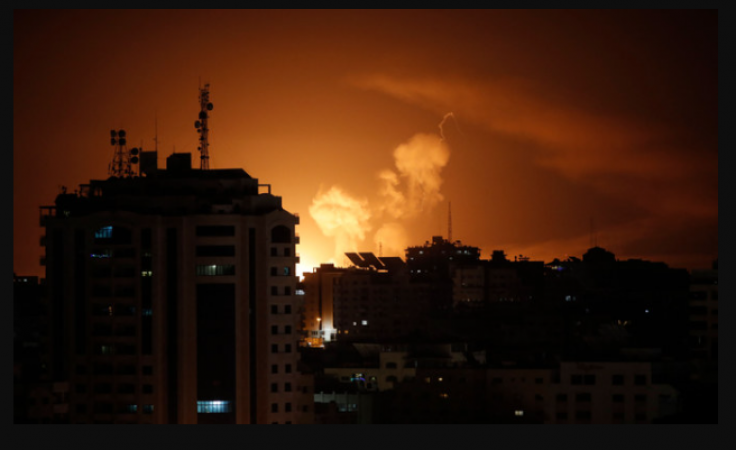
Jerusalem: In response to rocket attacks it blamed on the Islamist group Hamas, Israeli jets attacked targets in Lebanon and Gaza early on Friday. This came as tensions following police raids on Jerusalem's Al-Aqsa mosque earlier this week threatened to boil over.
Ground-shaking explosions shook various parts of Gaza as Israel claimed its jets targeted Hamas weapons factories and tunnels, which are in charge of the blockaded southern coastal strip.
As dawn drew near, the military announced that it had also hit Hamas targets in southern Lebanon, where locals near the Rashidiyeh refugee camp had heard three loud explosions.
Also Read: Seoul urges North Korea to stop using a factory complex in an unauthorized manner
Israeli officials blamed Hamas for the rocket attacks that came from Lebanon and targeted northern Israeli communities. According to the military, out of the 34 rockets fired from Lebanon, air defence systems were able to intercept 25 of them. It was the largest such assault since Israel and the heavily armed Hezbollah movement engaged in combat in 2006.
Benjamin Netanyahu, the prime minister, declared after a security cabinet meeting that Israel's response, both tonight and later, "will exact a significant price from our enemies."
No serious casualties were reported, despite the fact that rocket salvos and sirens sounded in Israeli towns and cities bordering Gaza as Israeli jets struck there.
The cross-border attacks happened as tensions over Israeli police raids at the Al-Aqsa mosque compound in Jerusalem during Ramadan, which this year falls during the Jewish Passover holiday, were rising.
In a statement, Hamas said that it "holds the Zionist occupation fully accountable for the grave escalation and the flagrant aggression against the Gaza Strip and for the consequences that will bring onto the region."
Also Read: Various events will be held in London to commemorate King Charles' coronation
Although Israel blamed Hamas for the attack on Thursday, which occurred while Ismail Haniyeh, the leader of Hamas, was in Lebanon, security experts said Hezbollah, the potent Shiite organisation that aids Israel's main foe Iran in projecting its power throughout the region, must have given its consent.
Although the shooting was not carried out by Hezbollah, Tamir Hayman, a former head of Israeli military intelligence, said on Twitter that it was difficult to believe that Hezbollah was unaware of it.
Najib Mikati, the prime minister of Lebanon, condemned any military operations from its territory that endangered stability in a statement, but Hezbollah did not immediately respond. Hashem Safieddine, a senior Hezbollah official, stated earlier on Thursday before the rockets were fired that any attack on Al-Aqsa "will inflame the entire region."
The deteriorating security situation complicates matters even more for Netanyahu's religious-nationalist administration, which has already had to deal with widespread opposition to its now-suspended plans to limit the Supreme Court's authority.
Nevertheless, following the rocket attack, opposition leader Yair Lapid said the government could rely on cross-party support, and Prime Minister Benjamin Netanyahu said Israelis supported the security forces.
"We will act against them wherever and whenever necessary, regardless of the internal debate in Israel. We are all in agreement on this, without exception," said Netanyahu.
Large plumes of smoke were seen rising above the northern Israeli border town of Shlomi after the rocket attack on Thursday, and there were damaged vehicles all over the streets. The northern airports in Haifa and Rosh Pina have been shut down, according to the Israel Airports Authority.
Speaking from a fortified room in her home in Shlomi, Liat Berkovitch Kravitz said to Israel's Channel 12 news, "I'm shaking, I'm in shock." I felt like something had exploded inside the room when I heard the boom.
According to the Israeli military, mortar rounds were also fired over the border.
The United Nations peacekeeping force in south Lebanon (UNIFIL) issued a statement in which it referred to the circumstances as "extremely serious" and urged restraint. According to UN representatives, the UN was in touch with the parties involved to try and defuse the situation.
After a year of increasing Israeli-Palestinian violence, the UN Security Council met behind closed doors to discuss the crisis amid worries that it could worsen.
Robert Wood, the deputy ambassador of the United States to the UN, told reporters as he arrived at the meeting: "It's going to be important for everyone to do what they can to calm tensions."
The attack on Thursday came after several rocket launches from Gaza towards Israel, the majority of which were stopped. In response to the launches, Israel carried out airstrikes on Hamas-affiliated targets, which it holds accountable for any attacks launched from the blockaded coastal area.
Mohammad Al-Braim, a representative of the Palestinian Popular Resistance Committees, spoke from Gaza and praised the rocket attacks from Lebanon that he connected to the Al-Aqsa incidents but did not take responsibility for.
Also Read: Trump is blamed in Biden's review of the chaotic Afghan withdrawal
No Arab or Muslim, according to him, "would remain silent while (Al-Aqsa) is being raided in such a savage and barbaric way without the enemy paying the price for its aggression," he said.